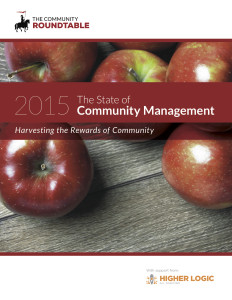By Rachel Happe, Co-Founder and Principal, The Community Roundtable
Today is a big day for The Community Roundtable – it’s the day we publish our annual research, The State of Community Management. Each year, we look forward to providing more data to support the work of online community professionals – those that enable, facilitate and inspire network of people to contribute in ways that generate more value than the sum of each individual contribution.
When we started The Community Roundtable we felt that research into the practices and resulting impacts of community was a core missing piece that could help demonstrate the value of community management. The research we do at TheCR is a collaboration between members of TheCR Network and TheCR research team. We work together with our members to ensure that we focus on and exploring the areas of biggest need to practitioners, so that the research is immediately practical and valuable – and evolves as quickly as the discipline does.
At the leading edges, the discipline of community management has moved beyond the idea that engagement is purely a matter of tactical execution and our members are working to build the operational structures and processes that reinforce a culture of engagement. We are also seeing organizations start to contemplate how business models and organizational strategies will need to change as a result of engagement with their ecosystems. For this reason, we broke up this year’s key findings into three critical categories for those working to make a community approach successful within larger organizations: strategy, operations and tactics. This year’s key findings are:
- Strategy: Invest in people and systems, not just platforms
- Operations: Advocacy Programs are More Than a Checkbox
- Tactics: Quick Wins Exist to Improve Engagement
In each of these areas, TheCR Network members told us that there was not enough data to help them educate their stakeholders, or an understanding of what it meant to do these things well. We took that input to heart, and asked for more detail in our research. As an example, advocacy and advocacy programs are a much-discussed topic but there is a wide variation what people think advocacy programs look like and it is often seen as an easy thing when, in fact, it requires a lot of planning, thought and investment to do well. This year’s research bears that out, showing that basic advocacy programs have minimal impact on engagement but multi-faceted programs, whcih address multiple roles and have significant benefits for advocates do have an impact on engagement and value.
We are particularly pleased this year to be able to break down the markers of community management maturity into maturity stages, which allows you to see more detail about what initiatives are most prevalent in each stage of a community’s lifecycle. This data helps considerably in building community roadmaps and providing stakeholders with data that supports it. Other new analysis features this year include:
- Reporting on ‘inactive’ populations in our engagement profile – critical for putting the other engagement categories into context.
- Discussion of some of our ‘data dilemmas’ as we analyzed the data, which will give you some insight into areas of the research that are still immature or non-standard.
Ultimately our goal with this research is to provide data that helps you:
- Plan and develop a roadmap
- Prioritize resources effectively
- Educate stakeholders
- Increase your credibility
- Demonstrating your value as a community professional
We hope this research supports your work and contributes to your success. If it does, we hope you will consider joining TheCR Network, contributing to the development of the discipline by sharing what you know, asking questions about what you don’t and participating in the evolution of our research in the future. The results will provide fuel for discussions and programming throughout the coming year, and we’d love to expand the conversation – and the number of people getting the benefits of TheCR Network.
Happy reading and please let us know if you have questions, suggestions or comments!


